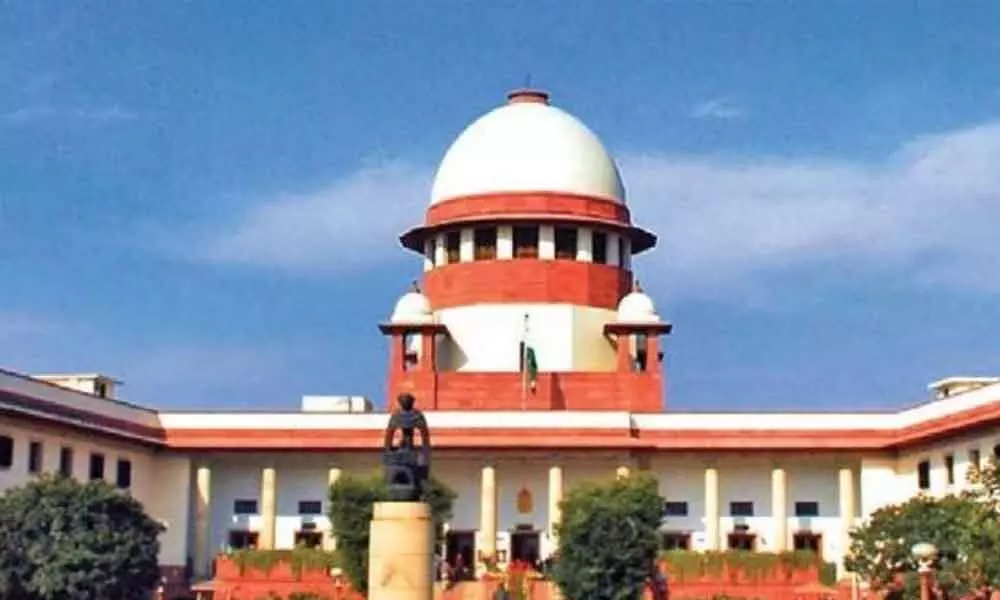Live
- Udupi MP’s queries, More key highways on high-priority
- Investing in Skills: Education Loans Paving the Way for Career Success
- Ghaggar river’s two stretches identified as polluted: Govt
- ICC chief Jay Shah meets Brisbane 2032 Olympics organising committee CEO
- Oxford Grammar High School Celebrates 44th Annual Sports Day with Grandeur
- Indian banking sector’s health remains robust, govt policy working very well: Top bankers
- iOS 18.2 Unveiled: New Features with ChatGPT Integration Revolutionize Your iPhone
- 'Run for Viksit Rajasthan' to be annual event, says CM Sharma
- Nitish Kumar launches '109 free medicine vehicles' in Patna
- India have to play their best cricket at the Gabba to win series: Harbhajan
Just In
Top bosses can't be held vicariously liable for criminal acts of company: Supreme Court


Supreme Court
The Supreme Court has ruled that senior company officials -- chairman, managing director, executive director, deputy general manager, planner and executor -- automatically cannot be held liable under the criminal law for offences committed by the company in the absence of specific allegations against them.
New Delhi: The Supreme Court has ruled that senior company officials -- chairman, managing director, executive director, deputy general manager, planner and executor -- automatically cannot be held liable under the criminal law for offences committed by the company in the absence of specific allegations against them.
In a judgment, a bench comprising MR Shah and AS Bopanna said: "Magistrate has to record his satisfaction about a prima facie case against the accused who are Managing Director, the Company Secretary and the Directors of the Company and the role played by them in their respective capacities which is sine qua non for initiating criminal proceedings against them".
The bench noted that there are no specific allegations with respect to the role played by senior officials in their capacity as chairman, managing director, executive director, deputy general manager and planner and executor.
"Merely because they are Chairman, Managing Director/Executive Director and/or Deputy General Manager and/or Planner/Supervisor of A1 & A6, without any specific role attributed and the role played by them in their capacity, they cannot be arrayed as an accused", said the top court, adding that they cannot be held vicariously liable for the offences committed by the company. The complainant had filed a private complaint alleging the accused had conspired with common intention to lay a water pipeline beneath the scheduled properties belonging to the complainant without any lawful authority and right. It was also alleged they had trespassed over the schedule properties and demolished the compound wall and destroyed 100 valuable trees and laid pipeline beneath the schedule properties.
According to the complaint, accused 1 and 6 were companies, while the accused number 2 to 5 and 7 to 13 were top officers or employees of the company.
The bench noted merely because respondent number 2 to 5 and 7 and 8 are the chairman, managing director, executive director, deputy general manager, planner and executor, automatically they cannot be held vicariously liable, unless, there are specific allegations and averments against them with respect to their individual role.
The bench noted that the chairman and executive director, at the time of demolition of the wall and cutting of trees, were stationed at Hyderabad and not present at the site.
The top court upheld the Karnataka High Court judgment and the sessions court, which had set aside the magistrate order, issuing summons against the accused.
The bench noted that there were no specific allegations regarding the role attributed to them, except a bald statement by complainant that they have connived with each other. The top court dismissed the appeal filed against Mangalore Special Economic Zone Ltd and others.

© 2024 Hyderabad Media House Limited/The Hans India. All rights reserved. Powered by hocalwire.com






